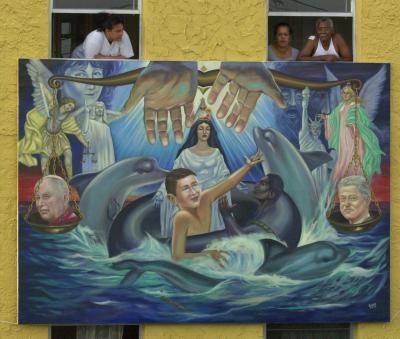U.S. Remains Top Food Source for Cuba
Mar 25 02:40 PM US/EasternBy WILL WEISSERTAssociated Press Writer
HAVANA (AP) - Since 2003, one country has been the main supplier of food to Fidel Castro's Cuba: the United States.
Surprised? You have good company.
Many Americans think their government's 45-year-old embargo blocks all trade with the communist government, but the United States is the top supplier of food and agricultural products to Cuba. In fact, many Cubans depend on rations grown in Arkansas and North Dakota for their rice and beans.
Since December 1999, governors, senators and congressmen from at least 28 U.S. states have visited Cuba, most to talk trade. They keep coming: Nebraska Gov. Dave Heineman was flying in Sunday with a farm delegation. Gov. C.L. "Butch" Otter of Idaho plans a visit next month.
Washington's sanctions choke off most trade with Cuba, but a law passed by Congress in 2000 authorized cash-only purchases of U.S. food and agricultural products and was cheered by major U.S. farm firms like Archer Daniels Midland Co. interested in the untapped Cuban market.
Cuba refused to import one grain of rice for more than a year because of a dispute over financing, but finally agreed to take advantage of the law after Hurricane Michelle in November 2001 cut into its food stocks.
Since then, Cuba has paid more than $1.5 billion for American food and agricultural products, said John Kavulich, senior policy adviser at the U.S.-Cuba Trade and Economic Council of New York.
The $340 million in exports in 2006 represented a drop of about 3 percent from 2005, which was down from nearly $392 million in 2004. Kavulich said the decline was caused mostly by generous subsidies and credits from Venezuela and China.
But the U.S. remains on top. Its main exports to Cuba include chicken, wheat, corn, rice and soybeans—much of it doled out to Cubans on the government ration. The United States also sends Cuba brand-name cola, mayonnaise, hot sauce and candy bars, as well as dairy cows.
Kirby Jones, founder of the U.S.-Cuba Trade Association in Washington, said Cuba's food import company Alimport has an entire department dedicated to American purchases.
Jones was in Cuba this month with Arkansas chicken exporters, Nebraska bean growers and officials from the Port of Corpus Christi, Texas.
"Hundreds and hundreds of American executives have come down here," he said. "(Cuban officials) know how to talk to us."
An assistant to Pedro Alvarez, Alimport's chairman, said the company could not comment without authorization from Cuban press officials.
But Cuban parliament speaker Ricardo Alarcon has said Havana does not expect the U.S. embargo to be eased under President Bush. The current administration tightened restrictions in 2004, further limiting U.S. travel and imposing stricter rules for Cuban payments on U.S. goods.
Don Mason of the Iowa Corn Growers Association agreed, saying he was "less than optimistic" Washington will make it easier to trade with Cuba any time soon. He said the association ships on the order of 450,000 metric tons of corn to the island each year.
Any significant change in U.S. policy would be difficult under the 1996 Helms-Burton law, which prohibits normalization of relations with Cuba as long as 80-year-old Fidel Castro or his brother Raul are in charge. Fidel temporarily ceded power to Raul after emergency intestinal surgery in July.
Despite repeated moves in Congress to ease or eliminate the sanctions, the embargo still has supporters from both parties in both houses.
U.S. Rep. Jerry Moran, a Kansas Republican, introduced a bill in February seeking to promote American agricultural sales to the island by letting Cuba directly wire payments to U.S. banks rather than route them through third countries. But a similar measure introduced in 2005 was not approved.
Some believe American interest in Cuba's new oil exploration efforts could change the political tide.
The island plans deep-water drilling, searching for deposits of crude oil less than 100 miles from Florida's coast. Energy companies from China, India, Spain and elsewhere are interested in investing, but American firms are shut out.
U.S. senators Larry Craig, an Idaho Republican, and Byron Dorgan, a North Dakota Democrat, introduced a measure this month that would open Cuban waters to U.S. oil and natural gas companies.
"If that passes, the embargo goes out the window," Jones said. "We're not talking about mayonnaise now. We're talking about million and millions of dollars."
"Nobody is in agreement…It’s that, no one says it and no one takes the risk to say it, to speak the truth. That’s what is happening. In other words, one of the foundations, of what are the regimes in the entire world, in all of history, has been fear and lies. In other words, once you are in fear that's when you don’t take a risk, where you collect yourself and don’t unite…understood? To be in fear is not to offer help to anyone because that signifies risk." -Gorki Águila Carrasco, lead singer, guitarist of the music group Porno Para Ricardo and political prisoner
"Socialist ideology, like so many others, has two main dangers. One stems from confused and incomplete readings of foreign texts, and the other from the arrogance and hidden rage of those who, in order to climb up in the world, pretend to be frantic defenders of the helpless so as to have shoulders on which to stand." --Jose Marti

View Che Guevara's Forgotten Victims on Scribd
SEARCH? GOOGLE IT!
Monday, March 26, 2007
WHAT EMBARGO?!
Subscribe to:
Post Comments (Atom)





No comments:
Post a Comment